So you’re wondering if Bora Bora is a safe place to travel to?
You’ve been daydreaming about the crystal clear waters of Bora Bora for months, right? Your desktop wallpaper is a breathtaking view of its turquoise lagoons and green mountains. You’re ready to soak in its picturesque beauty, maybe even catch a glimpse of its vibrant marine life.
But there’s a small question lingering in your mind – is Bora Bora a safe destination? As a mindful traveler, it’s important to consider more than just the gorgeous beaches and stunning sunsets. You want to be well-informed about the crime rate, potential natural disasters, and any health concerns. And you’re absolutely right! Safety is crucial for any travel experience. Let’s dive in and tackle these concerns head-on, shall we?
Is Bora Bora Safe to Travel?
In a nutshell – YES!
Bora Bora is widely recognized as one of the safest destinations in the world. It provides a secure environment for all travelers, including solo female travelers and LGBT couples.
That being said, since it’s a remote location with wild animals, tropical climate, and a unique culture, there are a few things to keep in mind.
Crime in Bora Bora
Being only 12 square miles in size with a population of about 11,000 people, Bora Bora has very low crime levels, even at night. However, while the crime rate is extremely low, it is not zero. If a crime is committed in Bora Bora, it will likely be petty crimes and limited to pickpocketing. I’ve never heard of bags being violently snatched or violent crime towards tourist. Domestic violence is quite high tho… 😔
To stay safe, use common sense and basic precautions: don’t leave any valuables unattended, especially on Matira Beach (it will disappear), and avoid flashing expensive items. I would recommend leaving designer bags and expensive jewelry at home.
If you’re staying on the main island, always remember to close your windows and lock your doors before leaving. If you’re staying in a resort, use the safe provided to store your valuables and cash. Theft in resort rooms in Bora Bora is rare, but it does happen from time to time.
Is it safe to swim in Bora Bora?
Swimming in Bora Bora is generally safe, but it’s important to take some precautions to ensure your safety.
Are there sharks in Bora Bora?

Yeah, Bora Bora is home to a bunch of sharks, but no worries, they’re actually friendly Blacktip reef sharks. Swimming with them is actually one of the coolest things to do in Bora Bora. You can find these smaller sharks in the lagoon, even around the resorts, and near the coral reef. They’re super curious and chill creatures, so you can easily spot them with their dorsal fin above the water and get a close-up look.
Don’t stress, the sharks in Bora Bora are used to humans and not aggressive at all. Reef sharks are pretty curious and might even swim up to you to check you out. Plus, the water is so clear that the chances of them mistaking you for prey are basically zero.
Just to be safe, it’s good to know that there hasn’t been a deadly shark attack in French Polynesia in the past 50 years. But hey, shark attacks are still rare, although there have been a few in Bora Bora over the past decade. The most recent one was in 2022, when a tourist got attacked while swimming near the reef. Luckily, it wasn’t fatal, just needed a few stitches.
If you do decide to swim with sharks, just follow these simple common sense rules: don’t feed them, don’t try to touch them, and avoid wearing shiny jewelry that could be mistaken for a little fish.
Stone fish are the real danger in the water
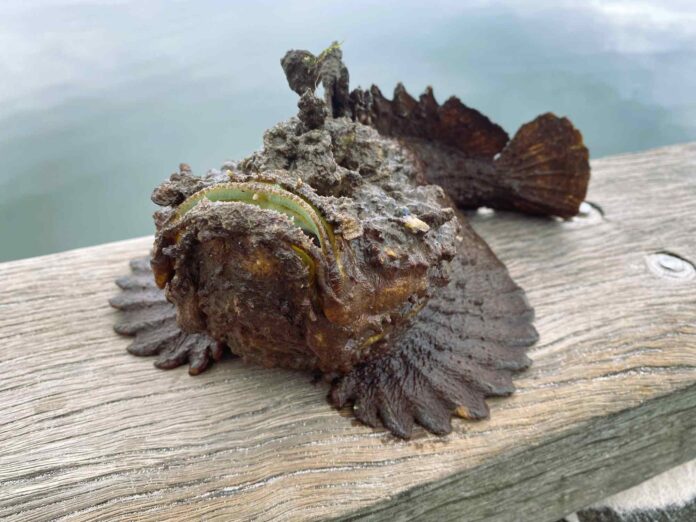
Sharks may be harmless in Bora Bora, but there are another creature that can cause harm if you’re very unlucky. The biggest threat is the stonefish, a venomous fish which, as its name suggests, look just like a stone. They blend in so well with their surroundings that they’re really hard to spot and if you accidentally step on one, their venomous spines can cause excruciating pain and even paralysis.
But hey, don’t stress too much. It’s been a while since anyone has reported a stonefish situation in Bora Bora. Plus, they tend to hang out in muddy-ish places, so the chances of running into one at Matira Beach or near the resorts are pretty slim.
Still, it’s always a good idea to play it safe. Wear some water shoes when you’re swimming in the lagoon or walking on the reef. And if, by some unfortunate twist of fate, you do get stung by a stonefish, make sure you seek medical attention immediately.
Corals may look pretty, but they can be dangerous too
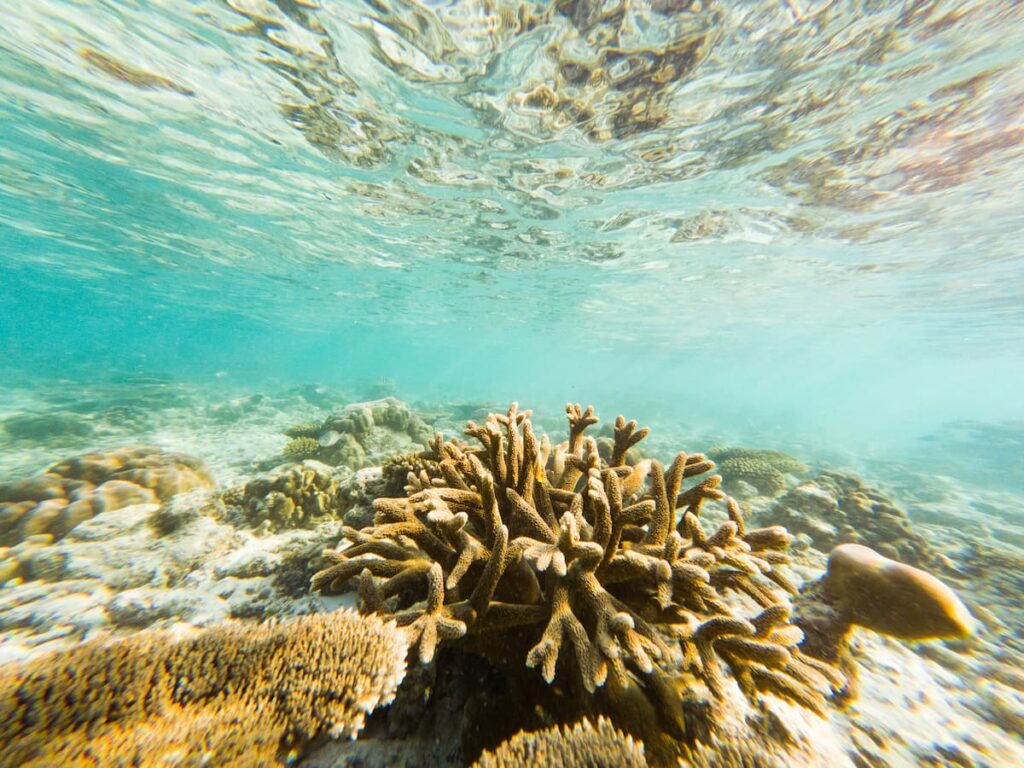
While we’re on the topic of creatures to watch out for in Bora Bora’s lagoon, let’s not forget about corals. These colorful and intricate structures may add to the beauty of the underwater world, but they can also cause harm if you’re not careful.
Make sure to always swim with caution and avoid touching or stepping on the corals. Not only can this damage the delicate ecosystem, but it can also lead to cuts for you. In addition, some species of coral are known to release toxins when touched, causing rashes and irritation.
Having lived in Bora Bora for a while, I unfortunately experienced coral cuts more often than I would have liked. If you cut yourself on coral, immediately pour or even rub – if you feel like a warrior 💪 – some fresh lime on the cut. It does not feel good AT ALL, but it will instantly kill all the bacteria that’s in the cut. This is how locals and surfers deal with coral cuts. Also, don’t be alarmed if the cut takes longer than a normal cut to heal. This is totally normal and often results in a nice, free “island tattoo.”
So remember, admire the corals from a safe distance and never be tempted to touch them.
Tide / Currents / Rough Seas
Just a heads up about Bora Bora’s lagoon: while it may seem all calm and inviting it’s important to be aware that this isn’t always the case.
At certain times of the day, the currents can become unexpectedly strong, which can be a bit risky for bad swimmers. It’s always a good idea to check with the beach boys for the latest conditions. On some days, the currents can even be forceful enough to carry you away from your overwater bungalow. If this happen to you just remember to stay calm and float on your back to conserve energy and get attention. The resorts have got your back with jet ski security and they’re super quick in their rescue efforts.
Additionally, the all-inclusive resorts provide lifebuoy in every bungalow and have floating lines surrounding them, which can be used to hold onto while waiting for help. Oh, and if you’re planning to pack a floaties, make sure to secure it tightly to your bungalow to keep it from drifting away.
Natural Disasters in Bora Bora
Tsunami in Bora Bora?
It is highly unlikely. Bora Bora is situated far from any major fault lines, making it a relatively safe place, shielded from earthquakes and tsunamis.
Cyclones / Hurricanes in Bora Bora?
Luckily, French Polynesia isn’t usually in the path of hurricanes. However, there’s a higher chance of one hitting Bora Bora during the rainy season, especially in January and February. Although it’s rare, hurricanes can still happen there. In fact, the most recent one was in 2010, causing significant damage to many resorts. Sadly, Bora Bora Lagoon Resort never recovered from that incident. To lower the risk of encountering a hurricane, it’s best to avoid traveling to Bora Bora between November and February, which is during the summer/rainy season.
Heat Waves in Bora Bora ?
No, no heat waves in Bora Bora, the temperature is pretty stable around the year. But during the summer months (rainy season), temperatures can reach up to 90°F (32°C), causing discomfort and even heat stroke for those who are not used to such high levels of heat and humidity. During the summer It’s important to stay hydrated and seek shelter in air-conditioned areas when necessary. Wearing lightweight and breathable clothing is also recommended.
Diseases in Bora Bora
Bora Bora is equipped with a dispensary and has several doctors on the islands. There is also a pharmacy, but it’s advisable to bring along some basic medication.
Dengue Virus in Bora Bora?
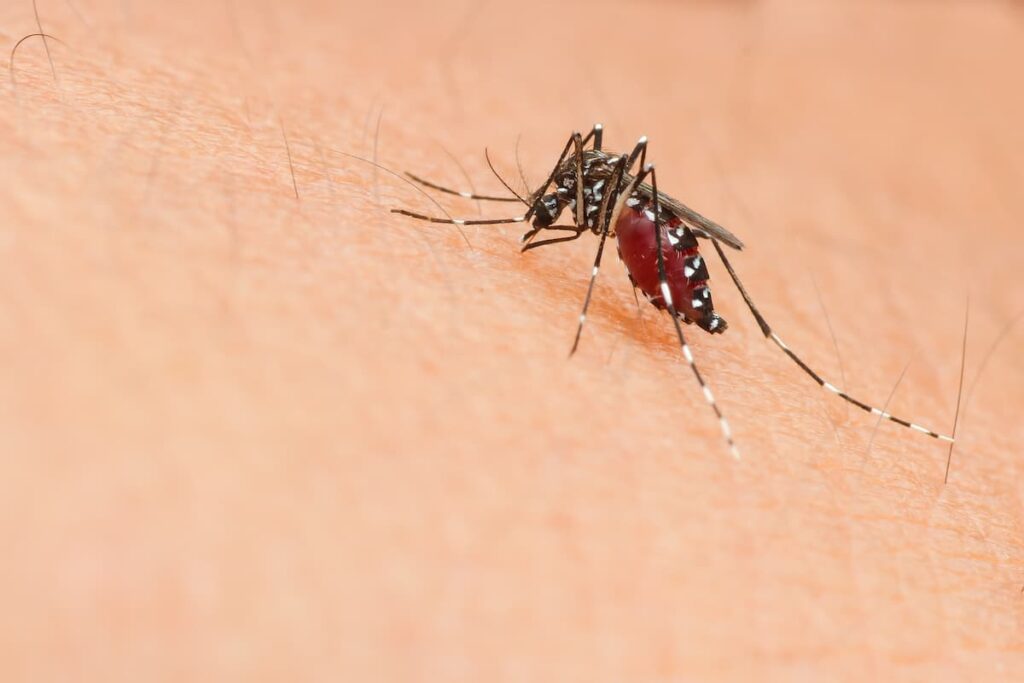
Even in paradise like Bora Bora, the dengue virus can still pose a risk. Outbreaks have occurred in 2013 and 2019. While the chances are low, it’s still possible to contract the virus. During our five-year stay in Bora Bora, my husband and I never contracted it, but we were aware of the risks. To minimize mosquito bites, it’s highly recommended packing bug spray with DEET and wear protective clothing, especially during peak mosquito activity in the early morning and late afternoon. By taking these simple precautions, you can greatly reduce the risk of being bitten by the virus-carrying mosquito.
Zika Virus in Bora Bora?
Similarly, the Zika virus has been reported in Bora Bora. While it’s not as prevalent as dengue, it’s still important to take precautions against mosquito bites. Pregnant women should also consult with their doctors before traveling to Bora Bora, as Zika can cause birth defects.
Malaria in Bora Bora?
No, malaria is not a concern in Bora Bora.
Safety Tips For Traveling In Bora Bora
Getting around the island
Getting around the island of Bora Bora is relatively safe, but there are some precautions you should take to ensure a smooth and safe trip.
If you decide to rent a car (which I highly recomand you to do if you stay on the main island) it’s important to maintain a slow speed when driving. Unexpected obstacles could appear on the road, such as bikes, children playing, dogs, or even roosters. Stay vigilant and prepared for anything that may come your way.
It’s better to avoid walking at night, not because you’ll get attacked (you won’t) but because of the limited public lighting and sidewalks. The low visibility in the dark increases the risk of accidents, as drivers may have trouble seeing pedestrians.
Be cautious of stray dogs
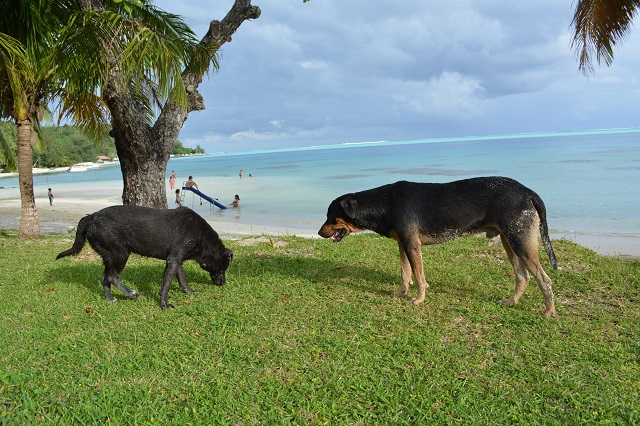
Although the situation is improving by massive sterilization campains, stray dogs remain a concern in Bora Bora and can be spotted throughout the island. These dogs are not used to being pets, and they can be very protective of their territory. If a stray dog approaches you, avoid panicking. Maintain a calm and assertive posture. Shouting or waving your arms can escalate the situation. Do not run: Running can trigger a chase instinct. Instead, back away slowly while maintaining eye contact. You can also say “ISH!” loudly to deter them.
Keep you valuable safe.
As mentioned earlier, pickpocketing and burglary are the main risks in Bora Bora. To ensure your safety, it is important to use common sense and take necessary precautions:
- Always lock your windows and doors when you leave.
- Use the safe provided in your resort to store valuables.
- Leave expensive jewelry and designer bags at home.
- Make sure you have copies of your passport, visa, travel itinerary, and credit/debit card numbers stored digitally or with a trusted friend in case of emergencies.
- Avoid carrying all your cash in one place.
Be cautious of the sun, sea, and mosquitoes.
- Pack plenty of reef-safe sunscreen (SPF50 minimum) and apply it regularly. Packing more sunscreen is a good idea since it can be expensive to buy on the island compared to your local stores back home.
- Consider wearing an SPF rashguard while in the water.
- Stay hydrated by drinking plenty of water at all time.
- Use caution when swimming in the ocean due to strong currents and sharp coral.
- Wear water shoes to protect your feet from stepping on corals.
- Pack enough insect repellent with DEET.
Better safe than sorry : Travel Insurance & medication
Consider purchasing travel insurance that covers medical expenses and emergency evacuation to ensure peace of mind during your trip. Safety Wings is my go-to travel insurance for all my trips. It is really affordable and they are super-responsive if anything happen.
If you have any pre-existing medical conditions, make sure to bring enough medication with you and carry a doctor’s note explaining your condition.
Pack smart – Safety items worth packing for Bora Bora
Are There Any Places To Avoid In Bora Bora?
No, not really.
However, it’s important to understand and respect the Polynesian culture, which places a strong emphasis on propriety. If you plan to rent a car, stick to the main road and avoid entering small roads and private properties without an invitation, as trespassing is not well received. Speaking a few Tahitian words can help :)
The same applies to renting a self-drive boat. Only dock on a motu beach if you have received an invitation, as all motus are private properties. If you’re staying at a motu resort, please be mindful of property limits indicated by signs. Going beyond these limits may not be appreciated by the locals, and you may encounter wild dogs. Lastly, when you come across fruit trees, it’s best to ask for permission before picking any fruit, even if they are located on the roadside.
I’d also stay away from the only night club of the island “Le Récif“. Like any other club, it’s all about alcohol and things can get messy on certain nights. And honestly, the club itself isn’t that exciting.
So, Is Bora Bora Safe to Visit?
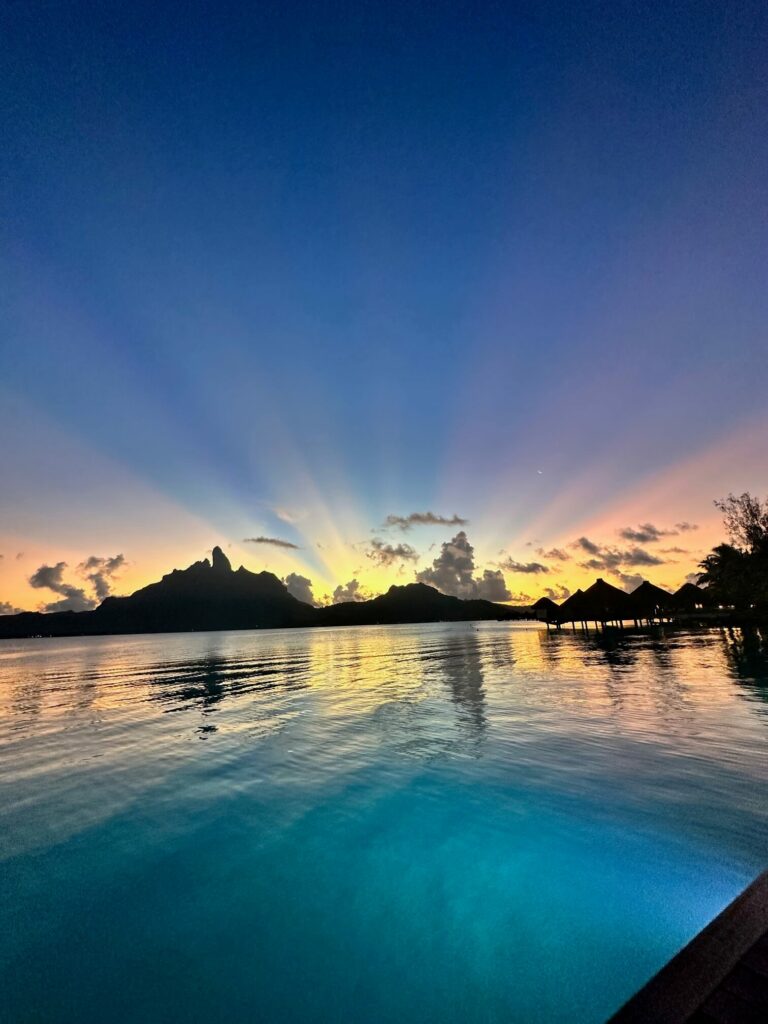
Yes, Bora Bora is an incredibly safe destination for tourists including female travelers and LGBT travelers but it’s important to be cautious.
Remember, your safety depends not only on the place you visit but also on your actions and decisions.
Stay vigilant, respect the local culture and environment, and prioritize your well-being. Get ready to be amazed by the stunning turquoise lagoons, lush mountains, and vibrant marine life of Bora Bora! With a little care and caution, you can fully enjoy this tropical paradise without any worries. It’s time to embark on an adventure and witness the breathtaking beauty of Bora Bora. Have an amazing and safe journey!
📌 Pintastic? Add it to your Pinterest board ⬇️
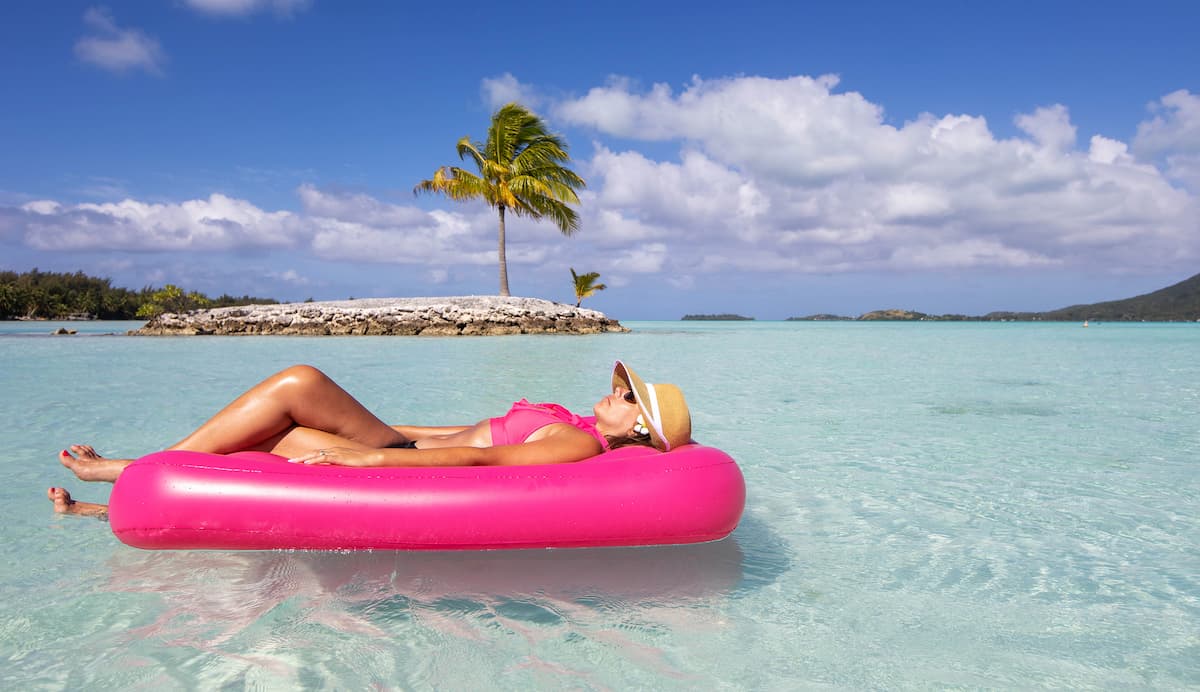
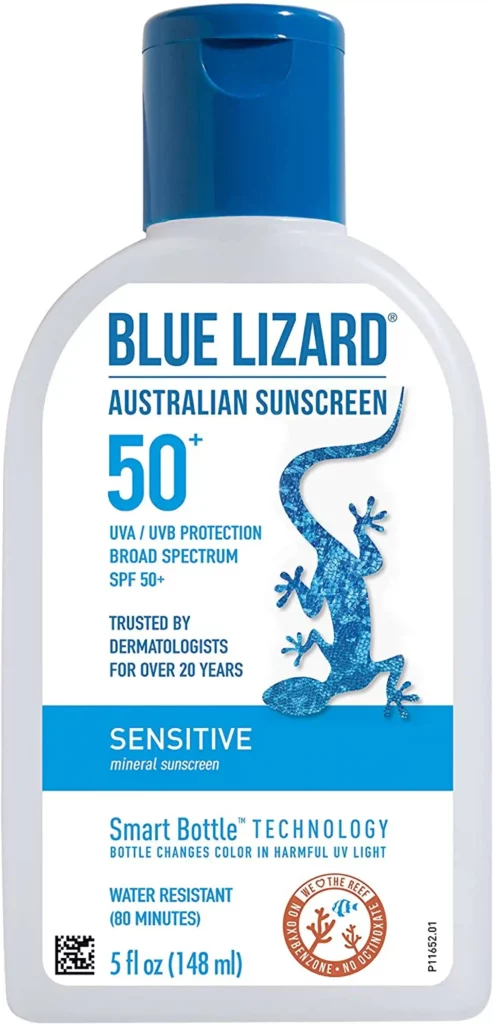

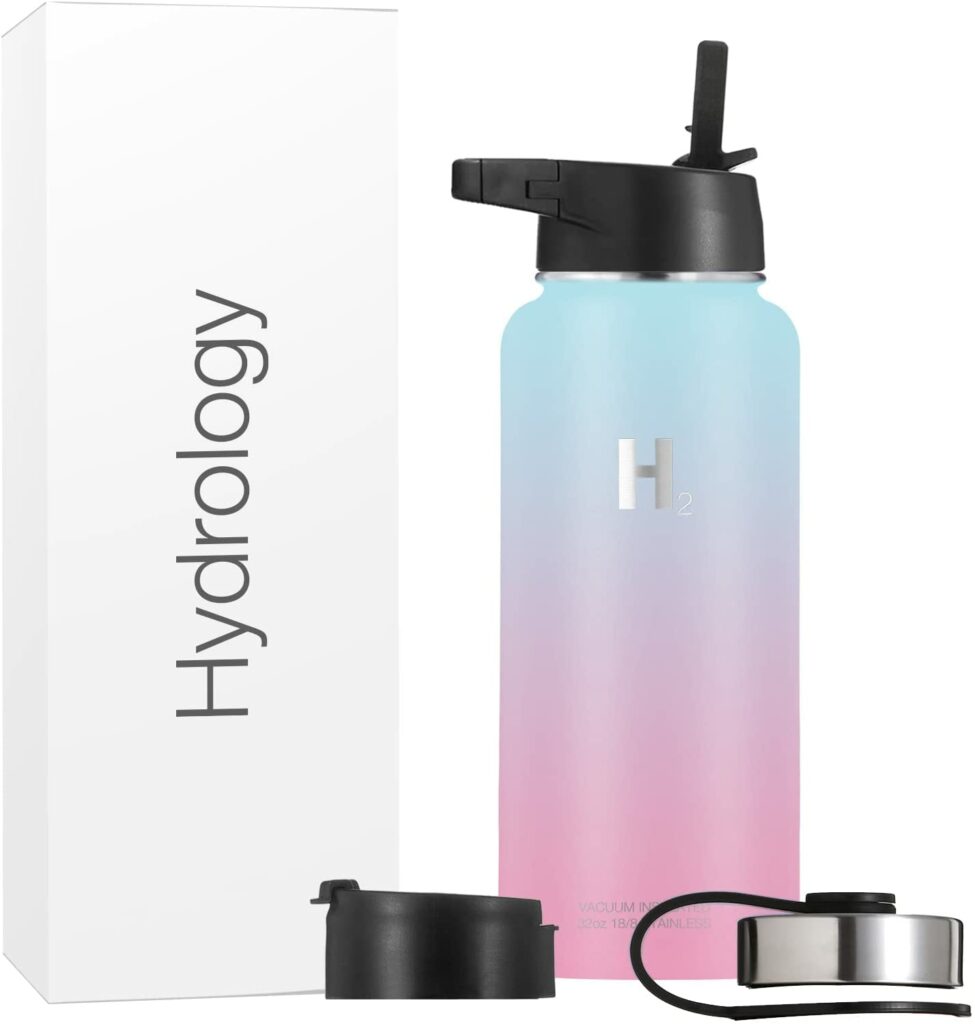
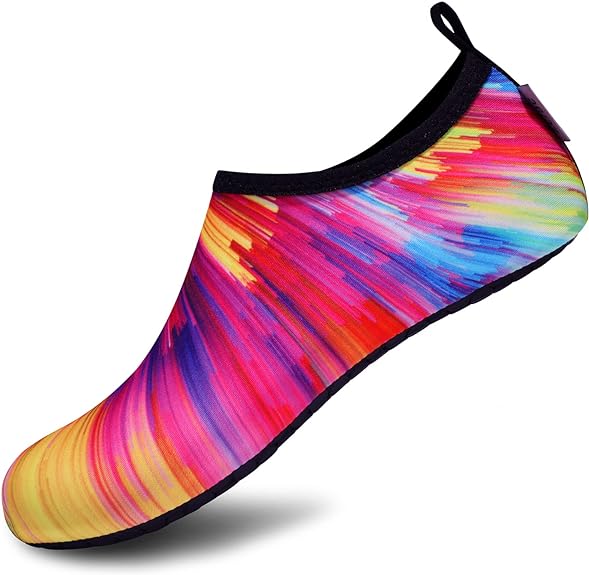
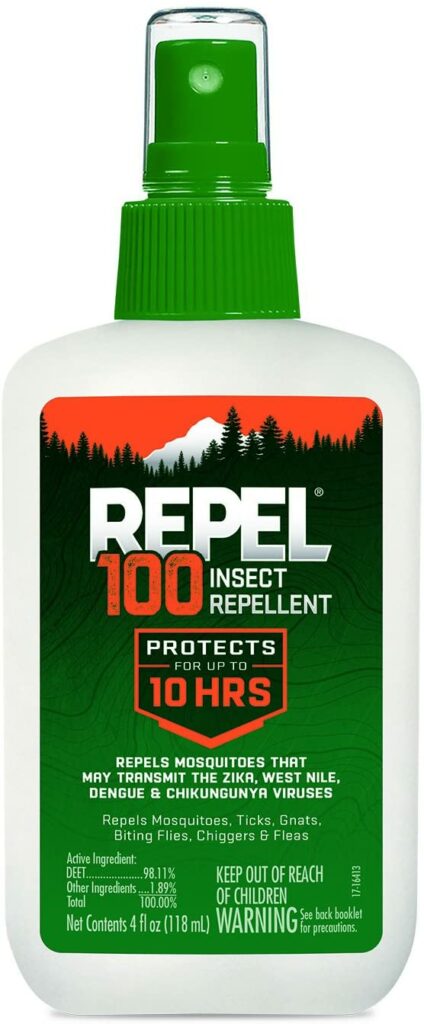
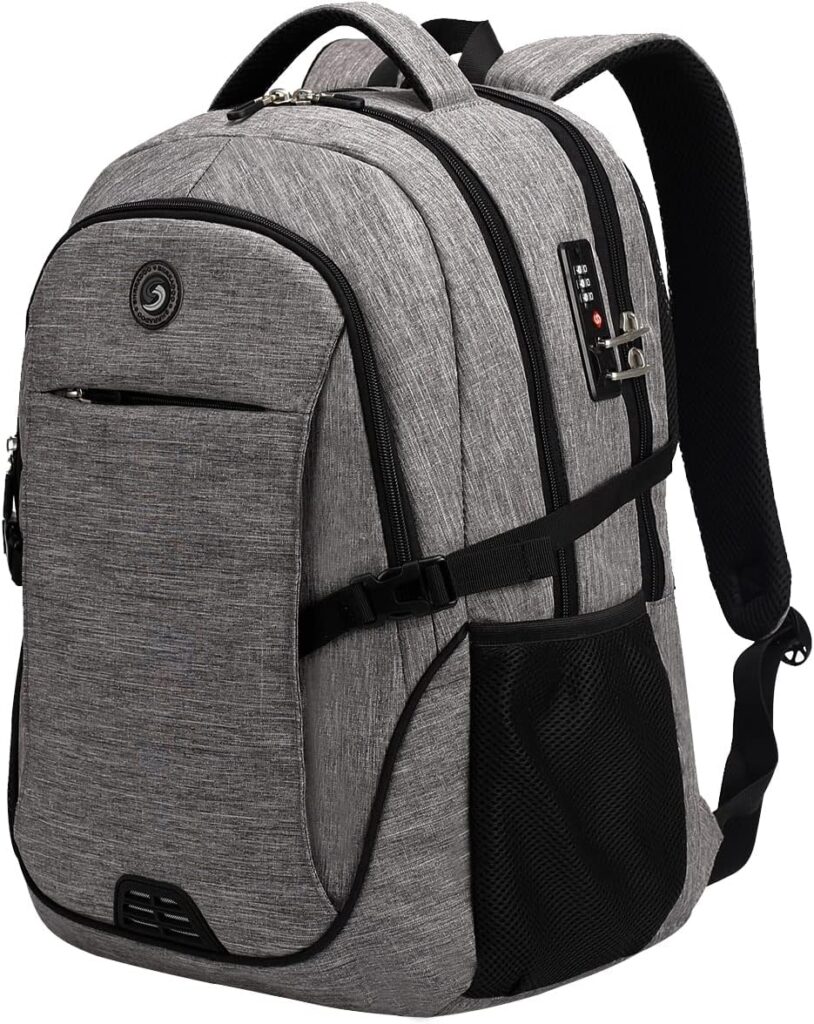
View comments
+ Leave a comment